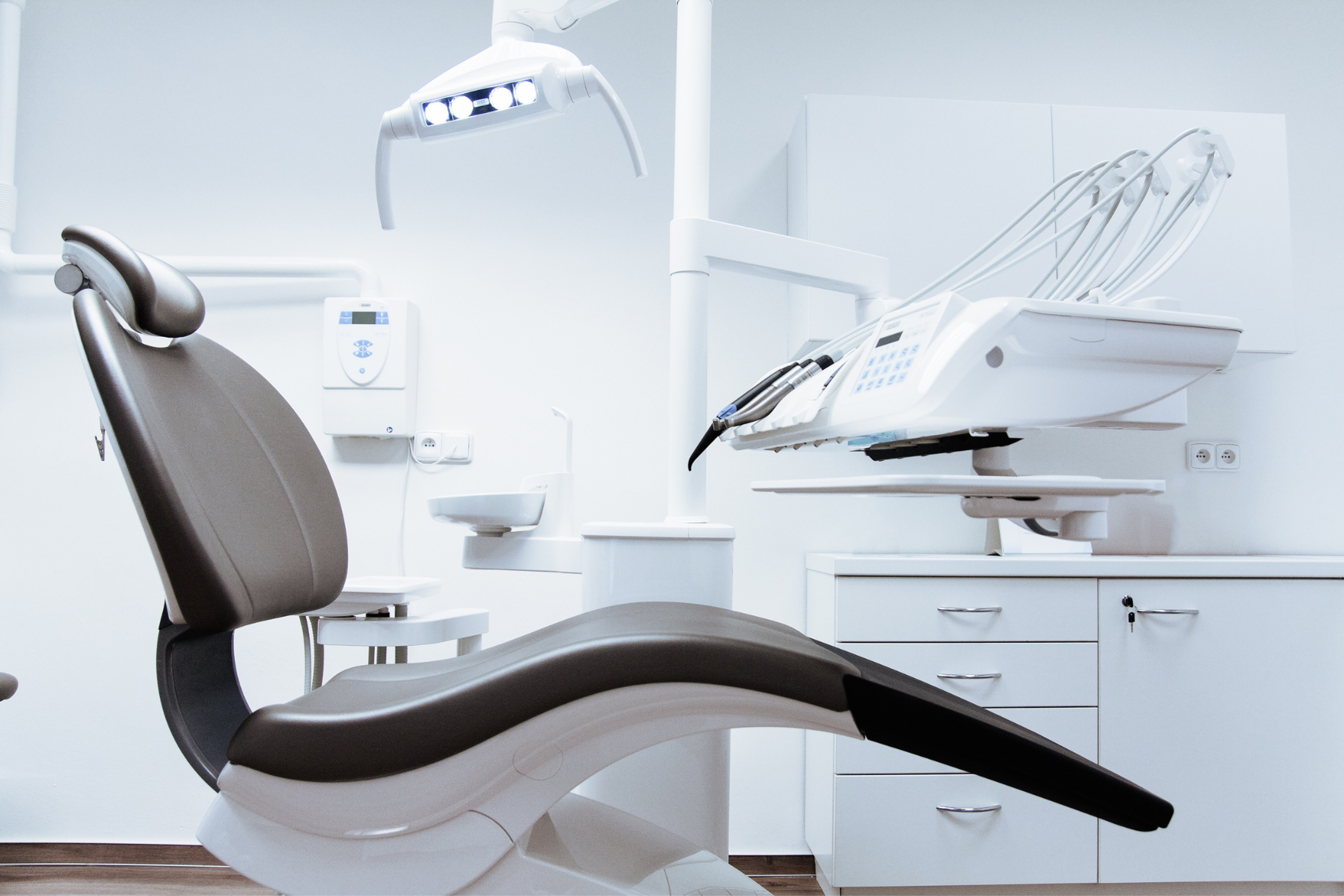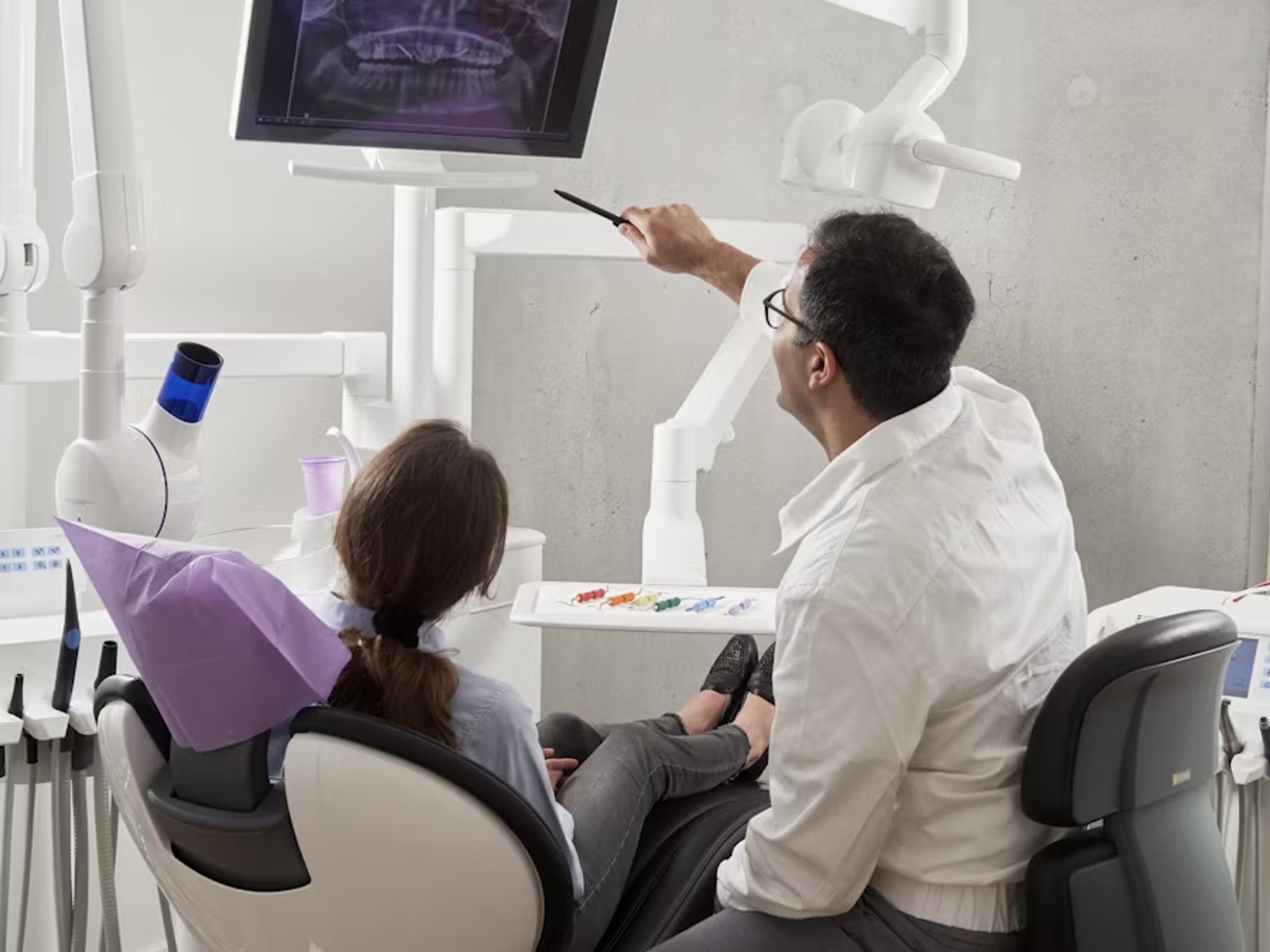The Most Common Dental School Interview Questions–and How to Answer Them
Get a winning edge in your dental school interviews with our guide to the different kinds of interview formats and most common questions. Discover tips, strategies, and insightful responses to prepare you for success.
Posted June 18, 2025

Table of Contents
Are you ready to sink your teeth into the world of dentistry and oral health? Well, before you can start drilling, filling, and scaring off your customers with the sharpest pick ever (just kidding!), you'll have to navigate the dental school interview process! But fear not, because we’ve got you covered with the ultimate guide to the most common dental school interview questions. So, put on those dental loupes and prepare to give your best smile because we’re about to dive into everything you need to know to smash your interview with your dream dental school!
Before we begin, we want to give you a quick overview of the dental school application as well as everything the interview stage entails, just to make sure you have all your bases covered. For an in-depth guide on all of the steps required to get into dental school, check out the recording of our recent Dental School Admissions Event!
The dental school application requires submission of multiple components:
- Academic transcripts from all higher education institutions
- Dental Admissions Test (DAT) scores
- Personal statement (generally 500-1000 words)
- Letters of recommendation (typically 2-3)
- Resume/CV
- Interviews
- After your application has been reviewed, you may be invited for an interview with the admissions committee. This is typically a one-on-one or panel interview, where you will be asked a variety of questions about your background, personal and professional experiences, motivation for pursuing dentistry, why you will make a good dentist, and why you will be a good fit for the program. This is arguably the most important step in the application process as it allows you to meet one-on-one with an admissions officer and is an opportunity for both parties to get to know each other face-to-face. Ideally, you will be prepared to verbalize your background, why you’re interested in dental school and becoming a dentist, and thoroughly answer any questions the officer may have. The interview will then be used to further assess your candidacy and determine admission.
Now that you have a sense of everything the process entails, let’s explore what you need to know for the interview portion of the application in order to get that ‘ACCEPTED’ stamp!
Read: How to Become a Dentist: Application, Degree Programs, FAQs
Overview of the DMD Application Interview
Depending on which school you are applying to, there may be a different format for the interview. Some common formats in the United States include:
- Traditional Interview: This is the most common format, where the interviewer will ask you a series of questions to learn more about you, your motivation for pursuing dentistry, your experiences, and your skills. This interview format may be one-on-one or a panel interview. This interview will also typically be in-person, if it is accessible for you, the applicant.
- Multiple Mini Interview (MMI): This format is becoming increasingly popular in dental school admissions. In an MMI interview, you will rotate through several stations where you are presented with a scenario, a question, or a task to complete at each stop you make. MMI questions are commonly designed to assess your communication skills, problem-solving abilities, ethical decision-making, character traits, and teamwork.
- Group Interview: In this format, you will be interviewed alongside a small group of applicants. The interviewer will ask a series of questions, and you will have an opportunity to share your thoughts, experiences, and perspectives while interacting with the rest of the applicants in your group. Although it is always important to collaborate with others and engage in friendly discourse, it is particularly critical to do so in this format.
- Video Interviews: This is a more recently adapted format that has become increasingly popular during the COVID-19 pandemic. In this interview, you may be asked to record yourself answering interview questions or participate in a live virtual interview over a video conferencing platform (i.e, Zoom).
Furthermore, you may either be “invited” to a dental school interview or be “guaranteed” one. “Invited” means that the admissions committee has reviewed your application and determined that you meet the minimum qualifications to be considered for an interview. Importantly, however, this does not necessarily mean that you will be offered an interview slot. Instead, you will need to compete with other applicants for the limited number of interview spots available. Interview spots are commonly granted based on a holistic review of the strength of your application and the academic potential you’ve shown through previous coursework, along with qualities demonstrated in your personal statement.
Conversely, “guaranteed” means that you have already been offered an interview slot, oftentimes as a result of a top academic record or test score.
Dental School Interview Common Questions and Sample Responses
Below are some common dental school interview questions in addition to sample high-quality answers to allow you to understand the types of responses interviewers are generally looking for – this will be your extracurricular activity for the next few months (i.e, be sure to practice answering these questions multiple times before your interview date)!
General Interviews (Traditional & Video)
- Q: Tell me about yourself.
- A: I am a [insert your current status, such as “recent graduate” or “senior undergraduate student”] majoring in [insert your major or field of study]. Throughout my academic career, I have been dedicated to pursuing my passion for dentistry, which has led me to volunteer at [insert relevant dental clinics, organizations, or events you have participated in]. Additionally, I have gained hands-on experience by shadowing dentists and working as a dental assistant at [insert relevant dental practices or clinics]. My strong work ethic and attention to detail have allowed me to excel in my academic coursework, and I have also demonstrated leadership skills through my involvement in [insert relevant extracurricular activities or organizations]...
- Pro Tip: Make sure you practice answering this question, as not only is it applicable to dental school interviews, but applications of all kinds in general
- A: I am a [insert your current status, such as “recent graduate” or “senior undergraduate student”] majoring in [insert your major or field of study]. Throughout my academic career, I have been dedicated to pursuing my passion for dentistry, which has led me to volunteer at [insert relevant dental clinics, organizations, or events you have participated in]. Additionally, I have gained hands-on experience by shadowing dentists and working as a dental assistant at [insert relevant dental practices or clinics]. My strong work ethic and attention to detail have allowed me to excel in my academic coursework, and I have also demonstrated leadership skills through my involvement in [insert relevant extracurricular activities or organizations]...
- Q: Why do you want to pursue a career in dentistry? Why did you choose this field over other healthcare careers and medical schools?
- A: Check out this YouTube video for a great sample response to this question!
- Q: What area of dentistry do you want to focus on?
- A: I am most interested in pursuing a career in orthodontics. I have always been fascinated by the ability of orthodontics to not only improve the appearance of a patient's smile but also correct functional problems that can affect their overall oral health. Throughout my undergraduate studies and dental shadowing experiences, I have gained exposure to different aspects of orthodontics, including the use of braces, clear aligners, and other orthodontic appliances. I have also had the opportunity to observe the positive impact that orthodontic treatment can have on a patient's self-confidence and quality of life. Ultimately, I believe that pursuing a career in orthodontics will allow me to make a meaningful difference in the lives of my patients.
- Q: What experience do you have within dentistry?
- A: I have gained valuable experience within dentistry through various opportunities, including volunteering at local clinics and shadowing practicing dentists. These experiences have allowed me to witness firsthand the impact that dental care can have on individuals and communities, and have inspired me to pursue a career in dentistry. I am eager to continue building upon this foundation of experience as I work towards becoming a successful dental professional.
- Q: What are your personal strengths and weaknesses?
- A: Check out this YouTube video for a great sample response to this question!
MMI Questions
- Q: You have a patient who is non-compliant with their oral hygiene routine. How do you motivate them to improve their oral health?
- A: When faced with a non-compliant patient, I would first try to understand the reason behind their behavior, whether it be due to a lack of understanding or motivation. Then, I would take the time to educate the patient on the importance of good oral hygiene and the potential consequences of neglecting it. I would also provide specific and achievable goals for the patient to work towards, and offer positive reinforcement and encouragement throughout the process. My overarching goal is to empower the patient to take ownership of their oral health and to work together with them to achieve optimal results.
- Q: You have a patient who is afraid of the dentist and has had a negative experience in the past. How do you create a comfortable and positive environment for this patient?
- A: Creating a comfortable and positive environment for patients who have had negative experiences with dentistry is crucial in building trust and easing their fears. Firstly, I would take the time to listen to the patient's concerns and fears, and empathize with their past experiences. I would then explain to the patient the specific procedures and steps involved in their treatment, in a way that is easy to understand and non-threatening. During the treatment, I would ensure that the patient is comfortable and offer breaks if needed. Finally, I would follow up with the patient after the treatment to ensure that they are satisfied and comfortable with the care they have received.
- Q: You are working in a team with other dental professionals to develop a treatment plan for a patient. How do you ensure that everyone's input is heard and that the team works together effectively?
- A: Check out this YouTube video for a great sample response to this question!
Group Interview Questions
- Q: Can you describe a situation where you had to work with someone who had a different approach or style than you, and how did you adapt to the situation?
- A: Check out this YouTube video for a great sample response to this question!
- Q: Tell me about your background and how you’ve gotten to where you are today.
- A: My interest in dentistry began during my undergraduate studies, where I took courses in anatomy and physiology and became fascinated with the intricacies of oral health. Since then, I have actively pursued opportunities to gain experience in the field, including shadowing practicing dentists and working as a dental assistant. These experiences have solidified my passion for dentistry and motivated me to pursue a career as a dental professional.
- Q: What is your experience working in a team, and how do you typically approach teamwork?
- A: Throughout my academic and professional experiences, I have had numerous opportunities to work in a team environment. I strongly believe that effective teamwork is key to achieving success, and I approach teamwork with a positive and collaborative attitude. I prioritize clear communication, mutual respect, and active participation, and strive to create a supportive and productive team dynamic.
Tips and/or Common Mistakes to Avoid
We know interview preparation can be a nerve-wracking experience, but there are several tips to keep in mind to help you make a good impression on the admissions team.
One common mistake to avoid is not doing enough research on the dental school you are applying to. Admissions committees want to see that you have a genuine interest in their program, so take some time to learn about their mission, curriculum, and any unique features of their program.
Another mistake to avoid is not practicing your responses to common interview questions. Be prepared to talk about your motivation for pursuing dentistry, your experiences, and your skill set. You can practice in advance with family members, friends, or classmates – just make sure it is someone you trust to provide genuine and constructive feedback.
In group interviews, it can be especially easy to get carried away and talk without leaving ample time for fellow students/interviewees. As a result, be concise with your responses and make sure you leave free time so that others may have the opportunity to discuss the topic at hand.
By following these tips and avoiding common mistakes, you can increase your chances of acing the interview and securing a spot in your desired dental school program!
Conclusion
By reading through our ultimate guide to dental school interviews, you’re well on your way to a successful application! To all of our dental school applicants and classes beyond, we wish you the best of luck – you got this!!!
Get expert support as you prepare for your dental school interview. Work 1:1 with a top dental school admissions coach to run mock interviews, refine your answers, and walk in with confidence. Browse dental school admissions coaches here.
Also, be sure to check out these resources:
- Harvard School of Dental Medicine–Program and Application Overview
- Writing a Winning Dental School Personal Statement
- DMD Vs DDS: What's the Difference and Which is Better?
- The Complete Guide to the Dental School Application
- The Top 25 Dental Schools – and How to Get In
FAQs
How to stand out in a dental school interview?
- Asking questions during your dental school interview is a great way to stand out from the crowd. By asking specific and detailed questions, you demonstrate your interest in the institution and its program.
What are the 7 most common interview questions and answers?
- The most common interview questions typically revolve around your background, skills, motivation, and career goals. Common questions include "Tell me about yourself," "What are your strengths?", "What are your weaknesses?", "Why do you want this job?", "Why should we hire you?", and "What are your salary expectations?". You should also be prepared to answer questions about your experience and how you handle stress.
How to answer why dentistry interview question?
- Example answer: “I first became interested in dentistry as a way to both learn and apply sciences. Dentistry has many opportunities for research and academia, but at the same time, you can apply your scientific knowledge in practical situations, whilst prioritising and problem solving.”
How to prepare for a dentistry interview?
- Practice possible Dentistry interview questions.
- Research the Dental School and the course you're applying for.
- Familiarise yourself with Dentistry/healthcare hot topics that you should know about.
- Keep up to date with Dentistry/healthcare-related news.
- Learn about some common dental conditions.
What are good questions to ask at the end of a school interview?
- What do you personally like most about working at this school?
- What do you find most challenging about working at this school?
- How would you describe your school's culture and ethos?
- How will you support me in my role as a senior leader?











